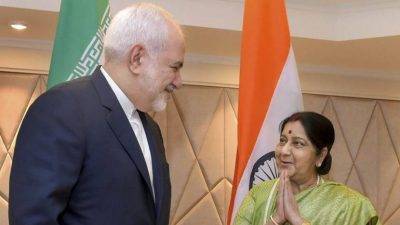Iran’s Relations with India and Pakistan. Couldn’t Be More Different

Iran is becoming increasingly desperate after the US intensified the economic component of its Hybrid War on the country, and while Indian Prime Minister Modi snubbed the Islamic Republic’s top diplomat during his visit to the country earlier this month and humiliatingly sent him back to his homeland empty-handed, his Pakistani counterpart Imran Khan warmly embraced Zarif and offered to mediate between Iran and the US.
Iran knows that it’s in trouble after the US rescinded its sanctions waiver for the country’s main oil partners in order to intensify the economic component of its Hybrid War on the Islamic Republic, with the intent being to deprive its rival of valuable budgetary revenue so as to compel it into undertaking painful austerity measures that could exacerbate the already-high risk of a Color Revolution. It was with this increasing strategic desperation in mind that the country dispatched its top diplomat to India earlier this month to plead for it to defy the US like it famously promised it would do last year and not submit to its unilateral sanctions regime.
Foreign Minister Zarif must have been sorely disappointed when he was unsurprisingly snubbed by Indian Prime Minister Modi who refused to meet with him so as to avoid sending any inadvertent signals to his American ally that India would even dare to consider going against Washington’s will, which is why Iran’s top diplomat was humiliatingly sent back to his homeland empty-handed after only having a brief chat with his Indian counterpart. To add insult to injury and ensure that Iran got the message that it was trying to convey, India shortly thereafter tested a surface-to-air missile that it jointly produced with “Israel“, putting to rest any hopes that New Delhi still endeavors to practice its over-hyped and now-outdated policy of “multi-alignment”.
Zarif’s dishonorable treatment by his Indian hosts was completely contrasted by the warm reception that he was just given by his Pakistani ones during his latest visit, where he met with Prime Minister Khan and was even told by his Foreign Ministry counterpart that Islamabad is willing to mediate between Iran and the US in pursuit of a peaceful solution to their latest tensions. This is very important because Pakistan already has decades’ worth of very solid ties with the US’ permanent military, intelligence, and diplomatic bureaucracies (“deep state”), which have most recently been put to use to promote the revived peace process in Afghanistan.
Perhaps sensing that Pakistani mediation could eventually be just as much of a game-changer in Iranian-American relations as it has been for American-Taliban ones, the Indian Ambassador to the US announced on the same day as Zarif’s arrival in the global pivot state that his country officially terminated its import of Iranian oil in response to Washington’s sanctions demands. The timing of this statement was very symbolic because it highlights just how different both South Asian states’ stances towards Iran are. India is playing partisan political games by unashamedly supporting the US’ policies, while Pakistan is trying to “balance” (or rather, in Indian political parlance, “multi-align”) between all Great Powers.
India wants to prove its loyalty to the US and remind America that its compliance with the unilateral sanctions regime against Iran is greatly contributing to the worsening economic crisis in the Islamic Republic, whereas Pakistan is flaunting its strategic independence by showing the world that it feels confident enough with its increasingly important geopolitical position to proactively play a leading diplomatic role in reducing tensions between those two countries. Just as significantly, Pakistan proved that it will continue to respect its partners’ state representatives instead of humiliating them like India just did to Zarif.
The main takeaway from Zarif’s totally different experiences visiting those two South Asian states is that Iran should seriously consider recalibrating its regional partnerships. India is no longer a reliable partner after it disrespected Iran’s top diplomat in such a shameful manner and then strongly signaled the strength of its new alliances with the US and “Israel” right after humiliating him. Pakistan, meanwhile, has shown itself to be totally dependable and genuinely interested in proactively playing a constructive role in supporting a peaceful solution to the latest Iranian-American tensions. As such, it would be wise for Iran to prioritize is relations with Pakistan in order to replace India as its regional strategic partner.
*
Note to readers: please click the share buttons above or below. Forward this article to your email lists. Crosspost on your blog site, internet forums. etc.
This article was originally published on Eurasia Future.
Andrew Korybko is an American Moscow-based political analyst specializing in the relationship between the US strategy in Afro-Eurasia, China’s One Belt One Road global vision of New Silk Road connectivity, and Hybrid Warfare. He is a frequent contributor to Global Research.

